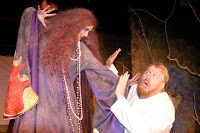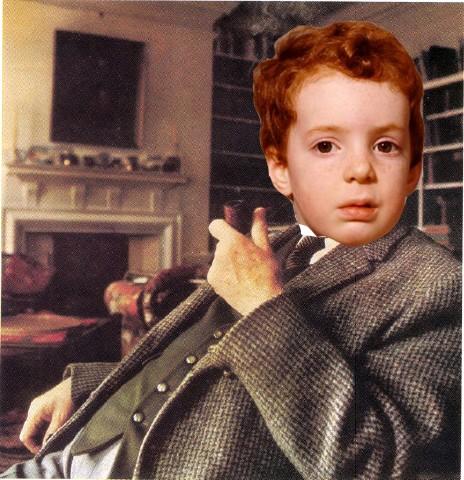
Well, blog-pals, 2006 has passed. On the plus side, Saddam is dead. On the other hand, so are Steve Irwin, James Brown, Peter Boyle, Joseph Barbera, Wilson Pickett, Don Knotts, Billy Preston, Robert Altman, and President Gerald Ford.
Brangelina adopted the entire nation of Haiti and most of Ethiopia in the bargain. Madonna tried to follow suit, but she's not as cute, so Oprah had to help her out.
At long last, JonBenet Ramsey's killer was identified, but he turned out to just be a creepy guy who knew her. Kenneth Lay was found guilty of fraud and conspiracy in the Enron scandal, but he died before he could serve one day in jail.
Megachurch pastors are gaining more media visibility for Christianity, but unfortunately some of them are secretly hiring gay prostitutes and then lying about it. The Democrats gained control of Congress, so at least there is some hope for W. Bush Hill, but unfortunately Hillary is still planning on running for President, so that hope is thin.
YouTube is the new MySpace, and Google is the new AT&T. The Russian government is still poisoning people who disagree with them. Paul McCartney's worthless wife has finally been shown the door, but she's managed to drag his name through the mud in the process.
And we're
still at war with Iraq.
Overall, 2006 has been lukewarmy or purgatory-ish at best: not too bad, not too good. There was no unbelievably horrific natural disaster or national tragedy involving terrorism, but neither was there peace on earth and good will toward men. Maybe it's too much to ask for '07 to be an improvement over this year, but then again, hope springs eternal from the bottom of Pandora's famous box, so let's (perhaps naïvely) assume the mantle of cautious optimism as we look to the future. In the words of the brilliant Lord Tennyson...
Ring out the old, ring in the new,
Ring, happy bells, across the snow:
The year is going, let him go;
Ring out the false, ring in the true.
Ring out the grief that saps the mind,
For those that here we see no more;
Ring out the feud of rich and poor,
Ring in redress to all mankind.
Ring out a slowly dying cause,
And ancient forms of party strife;
Ring in the nobler modes of life,
With sweeter manners, purer laws.
Ring out the want, the care, the sin,
The faithless coldness of the times;
Ring out, ring out my mournful rhymes
But ring the fuller minstrel in.
Ring out false pride in place and blood,
The civic slander and the spite;
Ring in the love of truth and right,
Ring in the common love of good.
Ring out old shapes of foul disease;
Ring out the narrowing lust of gold;
Ring out the thousand wars of old,
Ring in the thousand years of peace.
Ring in the valiant man and free,
The larger heart, the kindlier hand;
Ring out the darkness of the land,
Ring in the Christ that is to be.
Huzzah, Al.


 Yes, I thought that might capture your attention, you naughty blogfiends. Of course, what I mean is that they were totally writing kick-ass Elizabethan drama at about the same time. What did you think I meant?
Yes, I thought that might capture your attention, you naughty blogfiends. Of course, what I mean is that they were totally writing kick-ass Elizabethan drama at about the same time. What did you think I meant? Forget all those gloomy plays like I Never Sang For My Father, I Never Saw Another Butterfly, and Edith Stein!
Forget all those gloomy plays like I Never Sang For My Father, I Never Saw Another Butterfly, and Edith Stein!



 (For a glossary of Yiddish terms used in this playbill, visit
(For a glossary of Yiddish terms used in this playbill, visit 





 One of my favorite quotes about Tolkien is a simple statement by Diane Duane: "Because of Tolkien, the universe will forever genuinely contain magic." I guess it is his legacy that thousands of young and old readers are still inspired by the power of this simple man's imagination and probably will be for centuries to come. I often tell my wife, friends, and students that Tolkien will one day be regaled by scholars in much the same way that Shakespeare is today. True, as many Tolkien scholars and biographers point out, Tolkien is still not studied with any seriousness in higher academic curriculums, and most professors in the humanities would laugh at the idea of anyone specializing in Tolkien (whereas specializing in Franz Kafka or James Joyce is a perfectly legitimate choice?), but someday, probably long after I'm dead, Tolkien's epic contribution to literature will at long last be recognized by those who claim to be literary scholars. After all, Shakespeare was considered populist tripe in his day, too.
One of my favorite quotes about Tolkien is a simple statement by Diane Duane: "Because of Tolkien, the universe will forever genuinely contain magic." I guess it is his legacy that thousands of young and old readers are still inspired by the power of this simple man's imagination and probably will be for centuries to come. I often tell my wife, friends, and students that Tolkien will one day be regaled by scholars in much the same way that Shakespeare is today. True, as many Tolkien scholars and biographers point out, Tolkien is still not studied with any seriousness in higher academic curriculums, and most professors in the humanities would laugh at the idea of anyone specializing in Tolkien (whereas specializing in Franz Kafka or James Joyce is a perfectly legitimate choice?), but someday, probably long after I'm dead, Tolkien's epic contribution to literature will at long last be recognized by those who claim to be literary scholars. After all, Shakespeare was considered populist tripe in his day, too.













